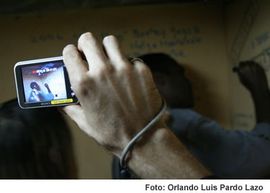
Rumors spread, murmurs become official notes and newspapers report - several weeks later - what the whole country already knows. We have gone from rationed information to a veritable "coming out" that flows in parallel with the censorship of the official media. Our glasnost has not been driven from offices and ministries, but has emerged in mobile phones, digital cameras and removable memories. The same black market that supplied powdered milk or detergent now offers illegal Internet connections and television programs that arrive through prohibited satellite dishes.
This is how we learned of the events in Venezuela during the last week. My own cell phone has been on the verge of collapse from so many messages telling me about the student protests and the closure of several television stations. I forward copies of these brief headlines to everyone in my address book, in a network that mimics viral transmission: I spread it to many and they in turn inoculate a hundred more with the information. There is no way to stop this form of broadcast news, because it does not use a fixed structure but mutates and adapts to each circumstance. It is anti-hegemonic, although the little word acquires different connotations in the Cuban case, where the hegemony has belonged to the newspaper Granma, the TV show The Round Table, and the DOR*.
We knew of the deaths in the psychiatric hospital days before the official announcement and we heard of the fate of those pushed out** in March 2009 through "radio bemba" - literally "lip radio" or Cuba's gossip network - and one day we will know that the "end" has come, before they authorize the press to report it. The flow of information has quintupled, although it does not obey a government decision to inform us of major events, rather it is technological development that has allowed us to skip over triumphalist headlines and newcasts empty of content. We are increasingly less dependent on the ideological pap of the television news. I know hundreds of people who haven't tuned into Cubavision and the rest of the national channels for months. They only watch forbidden television.
The screen of a Nokia or Motorola, the bright surface of a CD or the tiny little stick of a flash drive, shred our disinformation. On the other side of that veil of omissions and falsehoods - created over decades - there is an extension, unknown and new, that frightens and attracts us.
* The Cuban Communist Party Central Committee's Department of Revolutionary Orientation that determines the information policy of every newspaper in the country.
**Translator's note
In March 2009 vice president Carlos Lage and Foreign Minister Felipe Perez Roque, were removed from office.
Yoani's blog, Generation Y, can be read here in English translation. .
